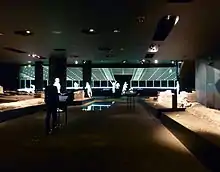Guildhall Art Gallery
The Guildhall Art Gallery houses the art collection of the City of London, England. It is a stone building in a semi-Gothic style intended to be sympathetic to the historic Guildhall, which is adjacent and to which it is connected internally.
.jpg.webp)
History
The original gallery was built in 1885 to house art collections from the City of London Corporation. After the original building was destroyed in The Blitz in 1941, a new facility was completed to house the collection, which includes about 4,000 items, in 1999.[1] The centrepiece of the collection, John Singleton Copley's huge painting depicting The Defeat of the Floating Batteries at Gibraltar, was placed in a prominent position in the entrance hall of the gallery.[2]
Vivien Knight was head of the Gallery, from 1983 until her death in 2009.[3]
Amphitheatre

The Guildhall complex was built on the site of London's Roman amphitheatre, and some of the remains of this are displayed in situ in a room in the basement of the art gallery.[4]
See also
- Alfred Temple, first director of the original gallery
- Statue of Margaret Thatcher, Guildhall Art Gallery
External links
References
- "London's Guildhall reveals hidden gems among collection of 4,000 paintings". The Guardian. 23 December 2014. Retrieved 22 July 2019.
- "The Defeat of the Floating Batteries at Gibraltar, September 1782". Art.UK. Retrieved 22 July 2019.
- Rose, Andrea. "Knight, Vivien Margaret (1953–2009)". ONDB. OUP. Retrieved 22 November 2017.
- "London's Roman Amphitheatre – Guildhall Galleries – City of London". www.cityoflondon.gov.uk. Retrieved 18 June 2017.